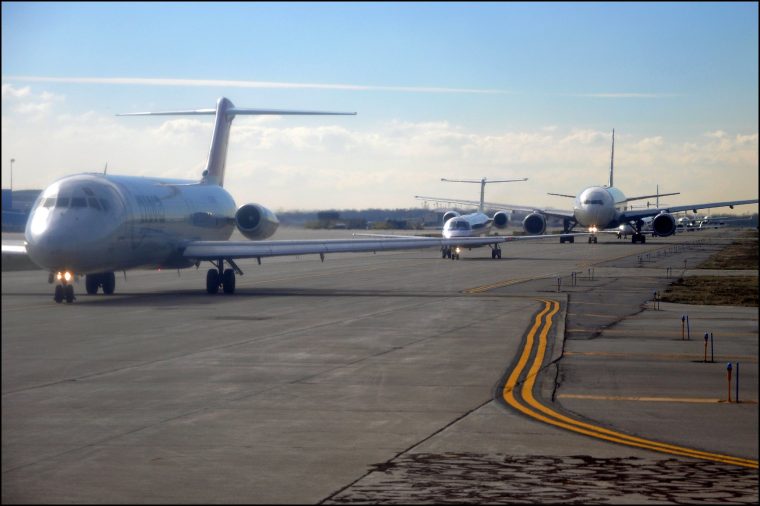At a time when air travel is surging to record levels and the skies are getting crowded, a new trend has emerged involving savvy travelers who are turning the long-standing practice of overbooking flights into a lucrative opportunity.
As these companies struggle to keep up with the demand and make the most out of it, passengers are starting to learn how to play the system and walk away with thousands of dollars in some cases as compensation for their trouble.
What was a frustration to many could now be turned into a potential windfall – here’s how.
Why do Airlines Overbook?

The practice of overbooking is nothing new for airlines. They sell more tickets than they can to ensure that the plane will fly at maximum capacity as there’s a percentage of passengers that will usually miss their flight.
These no-shows could occur due to missed connections, people who overslept, heavy traffic, or last-minute changes to their arrangements or schedules.
Also read: Flight Attendant Salary Guide for June 2024
To compensate for these predictable situations, airlines sell a number of seats that exceed the plane’s capacity and train their staff to deal with situations where statistics fail and all passengers – or a higher percentage than expected – do show up.
As Clint Henderson, managing editor of the travel blog The Points Guy, explains, “It’s always been a push and pull between airlines and consumers. I think this is a continuation of that.”
Post-Pandemic Travel Surge – Fewer Flights, More Passengers
Overbooking has become increasingly frequent in a post-pandemic era as travel has rebounded after social distancing and other restrictions were removed. Data from Airlines for America indicate that flights are now nearly as full as they were before the health crisis.
Meanwhile, in 2021, more people took flights than in 2019 before the pandemic began. This is considered a positive phenomenon that is helping airlines recover from the severe financial headaches they suffered back then.
However, as airlines were forced to sell, decommission, or repurpose planes, their capacity was shrunk as a result of the health event. Hence, the number of available flights and tickets diminished while the demand for travel is rising to pre-pandemic levels.
According to data from Airlines of America, airlines’ load factor in 2022 and 2022 was 82%. However, the number of aircraft departing is far lower compared to 2019. Two years ago, 9,216 planes departed from US airports while 9,635 navigated the skies in 2023. Comparably, in 2019 – before the pandemic – the number of departed planes was 10,405.
Meanwhile, the number of passengers who jumped on a plane last year ended at 946,216 – more than 16,000 more people compared to 2019. So, less planes, more passengers. The result: overbooked flights.
Compensation is Juicy for Volunteers Who Are Willing to Wait for the Next Flight
When a flight is overbooked, airlines are required by the Department of Transportation (DOT) to first ask for volunteers to give up their seats in exchange for compensation. If there aren’t enough volunteers, some passengers may be involuntarily bumped from the flight.
In cases of involuntary bumping, passengers have clear rights under DOT regulations. Airlines must provide affected passengers with a written statement explaining their rights and how the carrier decides who gets bumped.
More importantly, these passengers are entitled to significant monetary compensation, depending on the length of the delay to their final destination.
The Compensation Structure
The DOT has established a tiered system for compensation:
- No compensation if the airline arranges alternate transportation that gets you to your destination within one hour of your original scheduled arrival time.
- 200% of your one-way fare (up to $775) if you arrive 1-2 hours late (1-4 hours for international flights).
- 400% of your one-way fare (up to $1,550) if you arrive more than 2 hours late (4 hours for international flights), or if the airline doesn’t make alternate arrangements.
It’s crucial to note that passengers are entitled to receive this compensation in cash and not necessarily as airline vouchers or credit unless they accept the latter – which is not as attractive as the former.
Also read: Boeing Faces Worsening Crisis – Will It Survive Much Longer?
Strategies for Maximizing Compensation When Bumping
Savvy travelers have developed skills to maximize the compensation they would get from airlines if their flight is overbooked. They have found ways to increase their chances of being bumped and secure the most lucrative compensation packages.
One interesting approach is to choose flights strategically. Experienced travelers often target flights during peak travel seasons such as holidays or school breaks, when overbooking is more likely.
They also focus on popular business travel times like Monday mornings or Friday evenings, when flights are typically full. Additionally, destinations where major events are taking place such as concerts or sporting events are prime candidates for overbooking.
Moreover, before they even arrive at the airport, these travelers do their homework. They research their flights and check if they are nearly full or already sold out. This information gives them a good indication if the flight could be overbooked, which increases their chances of getting a bump.
Once at the gate, these travelers make themselves known to the airline staff. They proactively approach the gate agents and inquire about volunteer opportunities for overbooked flights. By doing so, they position themselves at the front of the line for potential compensation offers.
Patience is a virtue in the game of airline bumping. Experienced travelers know that they should not jump at the first offer they get from the airline. Airlines typically start offering low amounts and gradually increase and make the offer more appealing if they start to struggle to find willing volunteers. By holding out for better offers, savvy flyers often secure more substantial compensation.
However, the strategy doesn’t always end with just monetary compensation. These travelers understand the value of negotiating for additional perks. Beyond the cash or voucher offered, they ask for extras like meal vouchers, hotel accommodations for overnight stays, access to premium airport lounges, or even upgrades to business or first-class seats on their rescheduled flights.
Some travelers have turned what others may consider an inconvenience into a lucrative opportunity. Their experiences serve as case studies in successful bumping, with some walking away with thousands of dollars in compensation for a relatively minor adjustment to their travel plans. These strategies have transformed the once-dreaded prospect of being bumped from a flight into a potential windfall for those who know how to play the game.
Case Studies in Successful Bumping – One Lucky Passenger Got $10,000 from United
Some travelers have made the headlines after their lucrative bumping experiences. Here are a few notable instances that have been documented lately:
- In 2017, a family made global headlines by scoring $11,000 from Delta Airlines after being bumped from a series of flights during spring break.
- Kelly Lewis, a travel expert, recently earned $960 from American Airlines by volunteering to take a later flight from Austin to Phoenix. The airline also provided her with a hotel room and meal.
- One passenger received $4,000 for volunteering to take a flight nine hours later.
- In a high-profile case, a passenger named Allison Preiss earned as much as $10,000 from United Airlines after being involuntarily bumped from an overbooked flight.
The Airline Perspective
Although these instances were quite rewarding for the passengers involved, airlines must play a delicate balancing act when they overbook flights. The success of this practice for carriers relies on calculating risks carefully to make sure that full flights are maximizing revenues even if they have to pay thousands of dollars to passengers who are being bumped.
A spokesperson for United Airlines said recently that they have substantially lowered the number of yearly bumped passengers since 2017 after a high-profile incident took place that year when a passenger was dragged from a plane.
Since then, airlines have changed their policy and some are offering as much as $10,000 to people who are involuntarily removed from their flights due to overbooking.
Also read: The Top 40 Airlines: Who Is The Star On Social Media?
However, despite passenger volumes surging to record numbers in the past two years, airlines are still grappling with issues that affect their profitability including delays, inflation, labor shortages, and higher financing costs.
Clint Henderson of The Points Guy expresses concern about the potential impact of widespread knowledge of how overbooking compensation works by stating: “The airlines are not always the good guys, so I don’t want to make it sound like that. But at the same time, it’s not the most profitable business in the world.”
Tips for Travelers
For those seeking to take advantage of overbooking situations, here are some key tips to get the most from airlines:
- Know your rights: Familiarize yourself with DOT regulations regarding compensation for bumped passengers.
- Insist on cash: While airlines may offer vouchers, you’re entitled to receive cash for involuntary bumping. For voluntary decisions, you just need to make it clear that you won’t take vouchers.
- Be flexible: If you have the time, volunteering for bumping can position you to receive significant compensation and additional perks.
- Travel light: Stick to carry-on luggage to increase your flexibility in case you have to rebook your arrangements or take your time to check in your luggage.
- Happy Ending not Guaranteed: Remember that volunteering doesn’t guarantee you’ll be bumped and you might end up with a less desirable seat if the airline doesn’t need your spot.
The Future of Airline Bumping – How Long Will it Be a Thing?
As long as airlines have fewer flights and passenger volumes stay at historically high levels, overbooking will continue to be a usual practice.
According to data from IATA, airlines in the United States reported $14.8 billion in net profits in 2023 and are expected to generate a similar amount this year while their net margins will stand at 4.5%.
So, for now, informed passengers should continue to have the opportunity to turn what was once an inconvenience into a potential windfall.
